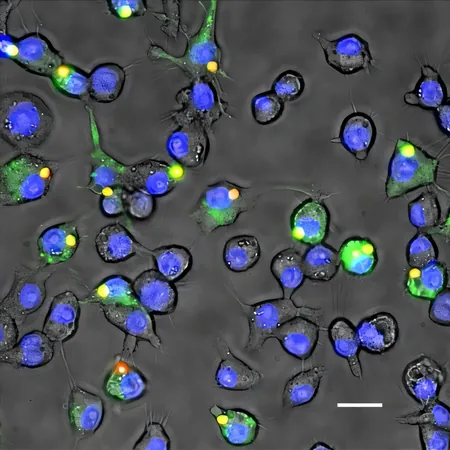
New Microparticle Technology Revolutionizes Protein Degradation Tracking in Immune Cells
2025-03-27
Author: Siti
New Microparticle Technology Revolutionizes Protein Degradation Tracking in Immune Cells
In a groundbreaking study, researchers from the FAMU-FSU College of Engineering have pioneered a method that vastly improves the understanding of protein degradation in immune cells through the use of specially engineered microparticles. Published in ACS Applied Materials & Interfaces, this innovative technique holds promise for advancing treatments for challenging diseases such as cancer, Alzheimer's disease, and various autoimmune disorders.
“Phagocytosis, the process by which cells ingest and eliminate debris and pathogens, remains poorly understood,” explained Jingjiao Guan, a professor in the Department of Chemical and Biomedical Engineering and co-author of the paper. “This research aims to equip scientists with new tools to deepen our understanding of these fundamental biological processes.”
A Game-Changer in Microparticle Design
The crux of the study revolves around the degradation of proteins and peptides within phagosomes, the specialized compartments in immune cells that are crucial for breaking down foreign particles and dead cells. Despite their significance in immune responses, the degradation mechanisms within phagosomes have not been clearly elucidated until now.
Guan's team has developed microparticles that incorporate fluorescent markers, enabling real-time observation of how immune cells process proteins and peptides. This novel approach not only enhances the understanding of immune system functionalities but also sheds light on potential malfunctions leading to diseases.
Traditionally, researchers have relied on plastic or silica beads coated with proteins or peptides to study phagocytosis. However, these methods are limited, as each bead accommodates only a single protein layer and does not mimic the complex structures found in natural biological systems.
In contrast, the microparticles designed by Guan's lab replicate the intricate compositions and structures found in living organisms. By utilizing cutting-edge microfabrication techniques, the team combined proteins and peptides with a responsive polymer, poly(N-isopropylacrylamide) (PNIPAM), which is unique for its ability to change properties based on environmental conditions like temperature. This responsiveness allows researchers to monitor immune cell interactions with the microparticles more effectively.
Implications for Medical Research
The implications of this research are vast, especially in terms of understanding immune responses in diseases such as cancer and neurodegenerative disorders. Remarkably, the study aims to investigate the degradation of the amyloid beta peptide, closely linked to Alzheimer’s disease, using these advanced microparticles. Such insights may reveal new targets for therapeutic intervention and provide a clearer picture of the disease's progression.
In collaboration with the FSU College of Medicine, Guan’s team is striving to bridge the gap between engineering and medicine. “Working with Dr. Guan has been a unique opportunity to integrate our expertise in medicine with engineering innovations,” remarked Yi Ren, a professor in the College of Medicine and co-author of the study.
Looking Ahead: Expanding Horizons
The researchers plan to apply for grants to further investigate microparticle applications in immune-related diseases. The versatility of these engineered particles allows for the study of a variety of proteins and peptides, providing the first comprehensive analysis of how different immune cells degrade these biomolecules inside phagosomes.
“Collaborating with Dr. Guan has been tremendously fulfilling,” noted Masahiro Fukuda, a doctoral candidate and co-author. “Our findings have the potential to revolutionize our understanding and treatment strategies for a range of diseases.”
As this research progresses, it could pave the way for innovative therapeutic approaches in tackling both immune system disorders and neurodegenerative diseases, marking a significant advancement in biomedical engineering and medicine. The future looks bright as scientists continue to unveil the mysteries of the immune system and its role in human health.




 Brasil (PT)
Brasil (PT)
 Canada (EN)
Canada (EN)
 Chile (ES)
Chile (ES)
 Česko (CS)
Česko (CS)
 대한민국 (KO)
대한민국 (KO)
 España (ES)
España (ES)
 France (FR)
France (FR)
 Hong Kong (EN)
Hong Kong (EN)
 Italia (IT)
Italia (IT)
 日本 (JA)
日本 (JA)
 Magyarország (HU)
Magyarország (HU)
 Norge (NO)
Norge (NO)
 Polska (PL)
Polska (PL)
 Schweiz (DE)
Schweiz (DE)
 Singapore (EN)
Singapore (EN)
 Sverige (SV)
Sverige (SV)
 Suomi (FI)
Suomi (FI)
 Türkiye (TR)
Türkiye (TR)
 الإمارات العربية المتحدة (AR)
الإمارات العربية المتحدة (AR)